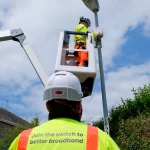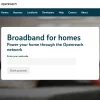Which is Really the Cheapest UK Phone and Unlimited Broadband ISP
Consumers are extremely sensitive to price and many base their choice of ISP on what they save in comparison to an existing package. But often the headline special offers won’t give you the full picture and as a result you could end up paying more than expected. We take a closer look at the price you pay for the “cheapest” packages.
Unfortunately one of the problems with examining and comparing deals from several ISPs is the enormous variation between package specifications, coverage, usage allowances and value-added features. As a result we’ve opted to centralise our comparison around those services that are available to most of the United Kingdom and which also offer an unlimited usage allowance. The cost of line rental and calls, where required, will also be factored.
Advertisement
In consideration of the above we have selected four standard broadband (sub-24Mbps) and four superfast broadband (24Mbps+) packages from different ISPs for our comparison, which excluding first year discounts should be among the markets cheapest. In addition, we will also examine the impact of current discounts on service price.
But before all that we want to touch on two very important aspects of service cost and delivery, specifically special offers and phone line rental.
Special Offers – Swings and Roundabouts
Spend even a small period of your time observing this market and you’ll quickly notice that the big ISPs have all developed a musical chairs approach to special offers. In fact not a single week seems to go buy when one package or another doesn’t exhibit some form of half-price discount, bonus shopping voucher or other twist in order to entice consumers and keep their offers in the public spotlight.
The trick here is that most of these discounts rotate in such a way that the underlying value proposition of a package doesn’t change too aggressively from month to month. For example, during one week an ISP might offer a free connection (example saving of £50), but the next week that connection fee might change to £25 (instead of the normal £50) and then they’ll add a shopping voucher worth £25.
Advertisement
Another popular example is the way in which an ISP might in one week make a big show of offering “6 months free service” and then the following month they’ll claim to go one better by offering “12 months of half-price service” for the same package. Put another way, most reductions are merely variations on the same rough level of discount.
Admittedly it’s not always like this and sometimes, often seasonally, you’ll see bigger discounts than usual and this is frequently driven by competition between rivals. For example Sky Broadband, in an effort to combat BT’s offer of free BTSport TV content with discounted broadband, has recently taken to offering major reductions (e.g. one or two years’ worth of free unlimited broadband) with certain bundles and packages.
Clearly it’s an aggressively competitive market out there, but also one where the true (normal) cost of a package is often lost in a sea of almost endlessly rotating discounts.
A Question of Line Rental
Of course it’s virtually impossible to talk about the price of broadband without also having to cost that age old bugbear of line rental, which is usually but not always a separate cost to that of your broadband service. It’s all very well an ISP claiming to offer 6 or 12 months “free broadband“, but a lot of what the provider may lose from such promotions can be reclaimed by keeping the price of phone line rental high.
Advertisement
A quick glance at some of the biggest ISPs today reveals that monthly line rental, at least on ISPs that make use of BTOpenreach’s national network, tends to stay about the same no matter who you pick. In fact it’s the one area that, year after year and without fail, consistently seems to rise in price above the level of inflation.
Example Line Rental Prices (Per Month – Data from Feb 2015)
BT – Standard Rental: £16.99 | Pre-Paid Rental (Monthly Equivalent): £14.15
Sky Broadband – Standard Rental: £16.40 | Pre-Paid Rental: None
TalkTalk – Standard Rental: £16.70 | Pre-Paid Rental: £15.03
The above ISPs typically operate off BT’s national UK telecoms platform and in most cases the base cost of wholesale line rental actually comes out at around £10 per month, which funnily enough has held fairly steady over the years while ISP charges have increased. Naturally ISPs need to add a profit margin on top and there are also variations in what services get included, but clearly there’s more to line rental than first meets the eye.
For example, TalkTalk’s line rental gives you free calls to other TalkTalk customers, but otherwise their phone charges are all pay-as-you-go style standard rates. By comparison BT and Sky both give you free UK weekend calls for the same price and standard rates at all other times. So TalkTalk’s broadband might normally be the cheapest of the three, but they make savings elsewhere and thus which ISP choice is going to save you the most money might also depend upon how you use the services they provide (i.e. free calls are more valuable to some than others).
The above is also one of the reasons why you can usually only get the best headline discounts by purchasing a broadband and phone service together (bundle) from the same ISP, which thus makes it easier for the provider to control their costs, platform and continuity of service.
Elsewhere some providers, such as cable and pure fibre optic (FTTH/P) ISPs, will claim to offer a truly standalone broadband service without the need for a phone line. But take this with a pinch of salt because you’ll still have a physical line entering your home and the subscription fee needs to reflect the cost of maintaining that, which more often than not means paying more than you think.
Mark is a professional technology writer, IT consultant and computer engineer from Dorset (England), he also founded ISPreview in 1999 and enjoys analysing the latest telecoms and broadband developments. Find me on X (Twitter), Mastodon, Facebook, BlueSky, Threads.net and Linkedin.
« UPDATE BT to Help Lancashire UK Reach 99% Superfast Broadband Cover
















































Comments are closed